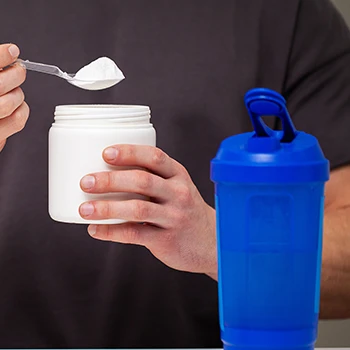Pre-workouts might look handy in many scenarios other than increasing physical exercise performance.
During my intense training seasons for soccer and martial arts, I found that taking pre-workout supplements not only boosted my physical performance but also kept me sharp during my coaching sessions and strategy meetings.
It made me turn my attention to the cognitive benefits of pre-workout supplements, exploring their potential to enhance mental clarity and focus during strategic planning and competitive preparations.
Quick Summary
- To maintain energy and focus at work, pre-workout supplements can be beneficial, especially for physically demanding jobs or those requiring sustained cognitive effort.
- Pre-workouts may enhance nervous system stimulation, increase blood flow and muscle strength, and improve focus and alertness, aiding in work performance.
- Nutritional Neuroscience reports that combining caffeine, up to 400 mg daily, with L-theanine in pre-workouts enhances mental performance, lowers anxiety, and boosts focus.
- In my view, the strategic use of pre-workout supplements before work can be a secret weapon for staying energized and focused, especially during long shifts.
Taking a Pre-workout Before Work

Based on the pre-workout supplement and the nature of the job, there are several compelling reasons to take supplements before going to work.
Just because some supplements' formulas are labeled as pre-workout, it doesn't imply that the substances they contain may or should be taken just to boost athletic performance.
For example, in some cases, the natural adaptogen Rhodiola Rosea may be an effective ergogenic supplement for powerlifters and bodybuilders since it increases endurance and strength [1].
In other circumstances, such as the workplace, Rhodiola Rosea may function as a potent, fast-acting nootropic, clearing away mental stress and confusion halfway through your shift at work, as per a study published in the BMC Complementary Medicine and Therapies [2].
So, generally, it is okay to use pre-workout supplements before going to work.
However, there are some caveats to consider:
- You should not use every pre-workout supplement without exercising.
- Supplements that do not include training do not benefit exercise performance (obviously).
- What you engage in rather than exercising matters.
I find this latter point to be particularly important.
Just because you can take some supplements without hitting the gym doesn't mean you should—at least not unless you're looking to improve several other non-athletic performance facets.
Benefits of Taking Pre-workouts Before Work

The best pre-workout supplements combine a variety of bioactive compounds to engage various performance-enhancing biopathways associated with competitive fitness and health performance [3].
The benefits of taking pre-workouts before work are:
- Nervous system stimulation: Pre-workout supplement ingredients like natural caffeine and beta-alanine not only improve physical performance but also offer you extra energy to aid you in getting more work done.
- Increased blood flow: The components also boost blood flow in blood vessels, which causes nitric oxide to be released from vessel walls, making your muscles stronger.
- Increased strength: Good products, like the summary pre-workout supplements, contain creatine monohydrate, which improves strength and muscle growth and extends the amount of time you can work in any physically demanding job before weariness kicks in [4].
- Focus and alertness: While you'll receive that additional boost that will help improve performance, the amino acids are also great for making you calm, attentive, and focused.
Compared to the energy drinks I've tried during long-haul flights for international matches, a good pre-workout offers a cleaner energy boost without the excessive flavorings and stimulants that can lead to a crash.
The Drawbacks of Pre-workout Before Work
With all the benefits come some disadvantages that you should be aware of:
- Sleep issues: If you take it too late, the high amounts of caffeine in it may keep you up when the evening draws.
- Adverse effects: The U.S. Food and Drug Administration warns that excessive intake of caffeine, often found in high amounts in pre-workout supplements, can lead to side effects such as insomnia and increased heart rate, which may be counterproductive for work performance [5].
3 Scenarios When You Should Take Pre-workout Before Work

You should take pre-workouts when your job or work is physically demanding, runs for an extended period, and requires cognitive abilities. Let's get into details about this.
1. Physically Demanding Labor
For jobs that keep you on your feet or demand extra energy, muscle-strengthening supplements are a big help. Sports nutrition highlights creatine and beta-alanine as key for energy boosts during tough tasks.
Creatine enhances power and muscle endurance [6]. The American Council on Exercise points out that beta-alanine, often found in pre-workouts, increases endurance, giving you more lasting energy for physically demanding work [7].
2. Long Hourly Shifts

“Most pre-workout drinks are just caffeine-based. They may have other ingredients that claim to “increase pumps” or “better utilize ATP' ' but it's basically the same as drinking Starbucks on your way to work. I recommend combining Caffeine and Theanine as studies show they are synergistic in terms of Theanine taking the edge off and preventing ‘the crash’.”
- Matt Theis, CEO of Momentum Nutrition
3. Competitive Cognitive Demands
For jobs that require intense mental effort, adding nootropics from pre-workout supplements can greatly boost brainpower. Once popular mainly in academic circles, nootropics are now widely used in various fields for their cognitive benefits.
The National Institutes of Health highlight that creatine, known for muscle-building, can also enhance memory and intelligence, aiding in complex mental tasks [9]. Plus, B-vitamins in pre-workouts improve brain function, ensuring energy and mental clarity all day [10].
For those whose job is to think, these supplements could be a real game-changer.
When You Shouldn't Take a Pre-workout Before Work

You shouldn't take a supplement if your work doesn't align with these scenarios. Otherwise, you should take it with a lot of caution.
Most supplements are geared towards heavy lifting and muscle-strengthening workouts. However, for muscle-building exercises, it's wise to steer clear of highly caffeinated pre-workout formulas.
If you're after a boost in your work environment and mild stimulation, opt for stimulant-free options or a nootropic.
FAQs
How Quickly Does Pre-workout Kick In?
Pre-workout kicks in 20 to 30 minutes after consumption.
What's the Best Time to Take a Pre-Workout?
The best time to take a pre-workout is 20 to 30 minutes before you start the actual work. It's during this time that caffeine reaches its peak effectiveness. Timing your intake is necessary to avoid a crash while benefiting from maximum energy potential and avoiding complications, such as sleep problems.
How Long Does Pre-workout Last in Your Body?
Pre-workout lasts in your body for four to six hours. The lasting effects depend on different factors, including your age, weight, and body fat.
How Much Pre-workout Should You Take When Working?
You should take around 400 mg per day. Yet, always read the label, follow the recommended dosage, and check the caffeine content per serving.
References:
- https://pubmed.ncbi.nlm.nih.gov/16948486/
- https://www.ncbi.nlm.nih.gov/pmc/articles/PMC3541197/
- https://pubmed.ncbi.nlm.nih.gov/30089501/
- https://pubmed.ncbi.nlm.nih.gov/14636102/
- https://www.fda.gov/consumers/consumer-updates/spilling-beans-how-much-caffeine-too-much
- https://www.ncbi.nlm.nih.gov/pmc/articles/PMC8949037/
- https://www.acefitness.org/continuing-education/certified/january-2019/7173/performance-and-nutritional-supplements-myths-and-realities/
- https://pubmed.ncbi.nlm.nih.gov/18681988/
- https://www.ncbi.nlm.nih.gov/pmc/articles/PMC6093191/
- https://www.ncbi.nlm.nih.gov/pmc/articles/PMC4772032/
About The Author
You May Also Like






